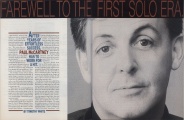Musician, February 1988: Difference between revisions
(+image links) |
(+text part 1) |
||
| Line 10: | Line 10: | ||
---- | ---- | ||
{{Bibliography text}} | {{Bibliography text}} | ||
"I recently took my kids Halloween trick or treating in America," says Paul McCartney, as he reclines in the darkwood-and-artwork-lined den of his London townhouse headquarters. "We went door-to-door to perfect strangers in a residential area around Los Angeles. I had on a black top hat and a big rubber mask that made me look like a ghoulish goofy." | |||
No one guessed that the dad behind the false face was a rock legend, although a few gave him quizzical glances. "I did start off with me own brown bag, but the look I was getting off some people was, '<i>Here</i>, buddy, wait a minute. This ''is'' for kids!'" | |||
The holiday season always makes McCartney feel wistful and vulnerable. It spells change, transition, the onrush of winter, the cold requisites of growth. He copes best by plunging into the next cycle, even if he must travel incognito. What bothered him most about the Halloween jaunt was the fact that he needed to be present at all. | |||
"These days, I'm ''not'' sending the kids out there alone," he assures. "Because of the safety and security thing, a lot of people won't play trick or treat. Instead, a lot of doors just close, residents being very unwelcoming, Dobermans growling in the yards." | |||
The world has changed since James Paul McCartney awoke to its vagaries on June 18, 1942, in Walton Hospital, Liverpool. The first son of sometime dance band pianist James McCartney and the former Mary Mohin, a visiting nurse, Paul led a blissful adolescence in the suburb of Allerton until his mother succumbed suddenly to cancer. He, brother Mike and their father pressed on despite the emotional devastation that often seized the parent. You do what you must, and Paul's fierce affection for skiffle music, Little Richard and the Everly Brothers soon led to professional feats that beggar superlatives. | |||
He was a Beatle from 1960 to 1970, but his career as a solo artist has now spanned two decades, beginning with outside movie soundtrack work in 1967, and leaving the Beatles behind with the April 1970 release of ''McCartney''. Now, with the appearance on both sides of the Atlantic of a two-record collection entitled ''All The Best'', a 20-year drive for artistic autonomy has come to a close. | |||
For the first decade-and-a-half of his post-Beatles career, everything Paul McCartney touched turned to gold. His critics said that such effortless success kept McCartney from pushing himself as hard as he should, but the public clearly loved the man ''and'' his music. Lately, though, the hits have not come so easily. His last several albums, ''Pipes of Peace'', ''Give My Regards to Broad Street'', (the final CBS LPs) and ''Press to Play'' (the first under a hefty new Capitol pact) met with a quiet commercial reception. The inner and outer pressure to demonstrate his viability in the rock landscape of the dawning 1990s is clearly mounting. "Paul's out there searching," says | |||
{{cx}} | {{cx}} | ||
{{rttc}} | |||
{{Bibliography notes header}} | {{Bibliography notes header}} | ||
Revision as of 08:03, 11 July 2014
|


